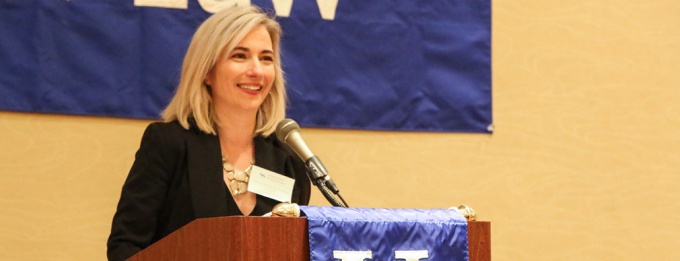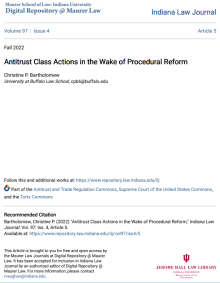
Bartholomew article up for honor by her peers
A major research paper by Professor Christine Pedigo Bartholomew, years in the making, is attracting a lot of attention.
The article, “Antitrust Class Actions in the Wake of Procedural Reform,” was published late last year in the Indiana Law Journal. Documenting the effects of two decades of procedural reforms on antitrust enforcement, it draws from more than 1,300 antitrust class action settlements.
Now Bartholomew’s article is a finalist for an Antitrust Writing Award, a joint venture of George Washington University and Concurrences, a clearinghouse for writing and events about antitrust. It’s one of 10 global entries in the Private Enforcement category of academic articles on antitrust law.
The winner will be chosen by an awards jury and by online balloting. The public portion of the vote is open to everyone, including UB Law boosters who want to support Bartholomew’s work. [Read the Article]
A former practitioner in antitrust law and consumer protection and a widely published scholar in the field, Bartholomew has established herself as an authoritative source in popular media as well. Most recently, she has been quoted in news stories on the Justice Department’s assertion that Google has subverted competition in internet advertising, and a consumer lawsuit seeking to block the merger of the Albertsons and Kroger grocery chains.
A few words with the law school’s resident authority on antitrust law:
Your article looks at a massive collection of class-action settlements in antitrust lawsuits. How did you assemble the data and make sense of it? No single database compiles antitrust settlements. Instead, I culled materials from multiple research platforms. After generating a list of cases that settled during the period of the study, I needed additional context. This meant I had to review the extensive motion practice for each settlement. In a single case, this could easily be in excess of 100 pages of materials.
You note that reform efforts have made antitrust suits more expensive and slower to execute. Do you conclude that these reforms work unfairly against the interests of those seeking relief? Yes. Judicially created procedural barriers hinder much-needed antitrust oversight—and more specifically, hobble consumer efforts to seek recourse for anticompetitive conduct. Said plainly, this leaves ill-gotten gains in the pockets of wrongdoers, at a cost to the stability and fairness of the economy.
Nine out of ten of these settlements involved wrongdoing by cartels. Can you give an example? Price fixing schemes were the most common type of cartel I studied. It is illegal for competitors to reach price agreements or artificially reduce supply. When price fixing occurs, the economy is deprived of independent decision-makers. Purchasers end up paying what we call “supracompetitive” prices, meaning prices higher than they would have paid in a competitive market.
You argue that some activists are pushing tort reform in the guise of consumer protection. Please say more about how that presents itself, and what lawyers can do to push back against these limits on awards. Private antitrust, namely antitrust class actions, play a large role in U.S. competition oversight. An antitrust class action settlement must receive judicial approval. During the approval process, those with questions or concerns can raise them with the court. This process has created the rise of “professional objectors,” meaning individuals who repeatedly challenge class action settlements. A subset of these professional objectors are individuals seeking to narrow the use of class action procedures, with the long-term goal of less regulatory oversight.
What can lawyers do to push back? The main advice I can offer attorneys advocating for settlement approval, be it on the defense or plaintiff side, is to investigate objectors. Are they repeat objectors? Who is actually behind the objection: class members or someone else directing them to file an objection? What is the basis of their concern? Is it specific to the case or just boilerplate? Then share what you uncover with the courts, as it will help judges evaluate the legitimacy of the objection.
You’ve become a go-to source for media outlets reporting on antitrust issues. Is that a role you enjoy, or is it difficult to educate generalist reporters on the fine points of consumer protection law? I can talk antitrust all day, any day. (Just ask my children.) Currently, there is a revival of populist interest in antitrust and its potential consumer protection gains. Antitrust cases seem complex. But as I tell my students, it’s not that bad if you break down what’s going on. And maybe just because I am, first and foremost, a teacher, I appreciate any reporter who asks for clarification on some dimension of a pending deal or investigation. It’s often only through news sources that the public learns how antitrust policy impacts their pocketbook.
